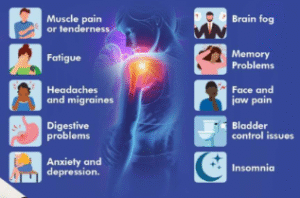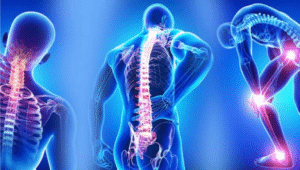A Closer Look at the Symptoms of Fibromyalgia in Men
Fibromyalgia is often considered a condition that primarily affects women, and this assumption has created a significant gap in diagnosis and treatment for men. While women do represent the majority of diagnosed cases, men are not immune. In fact, men with fibromyalgia may endure the condition in silence, leading to late diagnoses and untreated symptoms.
Men may experience fibromyalgia differently than women. Their symptoms can be just as intense but may present in less obvious ways. Social stigma, cultural expectations, and hormonal differences also influence how fibromyalgia manifests and is perceived in males.
Understanding the specific symptoms of fibromyalgia in men is essential for timely intervention and effective management.
Chronic and Widespread Pain
Pain is the hallmark of fibromyalgia, and for men, it often begins subtly before becoming widespread. Male patients describe the pain as a deep, aching discomfort that spreads throughout the muscles and soft tissues. It can appear on both sides of the body and above and below the waist.
In men, this pain may be brushed off as muscle soreness or a side effect of physical labor, especially since men are more likely to attribute physical symptoms to overexertion. However, fibromyalgia pain is persistent and does not improve with rest or physical therapy alone.
Fatigue and Low Energy Levels
Fatigue in male fibromyalgia sufferers is commonly underreported but deeply impactful. Men may describe it as feeling “drained,” “sluggish,” or “just not right.” It is not the usual tiredness that goes away after a nap but a constant, unrelenting exhaustion.
This fatigue makes it difficult to maintain productivity, participate in physical activities, or stay engaged in family responsibilities. It can also lead to irritability, further complicating interpersonal relationships.
Cognitive Issues and Brain Fog
Cognitive difficulties, often called “fibro fog,” are just as prevalent in men as in women. This includes problems with concentration, short-term memory, decision-making, and word-finding. Men might find themselves forgetting meetings, misplacing items, or struggling with tasks that were once simple.
Because these symptoms can mimic attention disorders or early cognitive decline, they are sometimes misdiagnosed or ignored. However, fibro fog is a legitimate and distressing symptom of fibromyalgia.
Sleep Disorders and Disrupted Rest
Men with fibromyalgia often struggle with insomnia, restless sleep, or sleep that is not refreshing. Even after a full night’s sleep, they may wake up feeling tired and sore. Conditions like sleep apnea, which are more prevalent in men, may coexist with fibromyalgia and worsen its symptoms.
Poor sleep contributes to heightened pain sensitivity, emotional disturbances, and difficulty functioning during the day.
Depression and Emotional Blunting
Emotional symptoms in men with fibromyalgia are frequently masked due to societal norms that discourage men from expressing vulnerability. However, depression and anxiety are common among male patients.
Men may not always report feelings of sadness but may experience emotional numbness, increased anger, irritability, or loss of interest in activities they once enjoyed. These symptoms, while less visible, are equally harmful and deserve clinical attention.
Digestive Complaints and Irritable Bowel Syndrome
Fibromyalgia can also affect gastrointestinal function. Men may experience irritable bowel syndrome symptoms such as abdominal cramps, bloating, constipation, or diarrhea. These digestive complaints can fluctuate and often worsen with stress or dietary changes.
Men might hesitate to bring up these issues during medical visits, considering them minor or unrelated, which delays diagnosis and appropriate treatment.
Sensory Sensitivities
Another lesser-known symptom in men is increased sensitivity to sensory input such as bright lights, loud noises, strong smells, and changes in temperature. While these sensitivities may seem unusual, they are part of the neurological dysfunction associated with fibromyalgia.
Men may notice a lower tolerance for environments that once felt comfortable, contributing to avoidance behavior and social withdrawal.
Muscle Stiffness and Mobility Challenges
Stiffness, especially in the morning or after prolonged sitting, is common in fibromyalgia. Men often report feeling as if their joints or muscles are tight and hard to move, even though there is no inflammation present.
This stiffness affects flexibility and mobility, making everyday tasks more difficult. It may also impact posture and gait, leading to additional strain on the body.
Headaches and Facial Pain
Men with fibromyalgia may suffer from chronic headaches or migraines, often described as tension headaches that start at the neck or skull base. These headaches may be severe and accompanied by light sensitivity, blurred vision, or jaw pain.
The presence of temporomandibular joint disorders, or TMJ, can exacerbate facial and head discomfort, especially under stress.
Numbness, Tingling, and Neuropathy-like Sensations
Tingling or numbness in the hands and feet is a common but confusing symptom of fibromyalgia in men. These sensations may mimic those of neuropathy but do not follow specific nerve pathways or show nerve damage upon testing.
This neurological disruption can feel unsettling and lead to unnecessary tests if fibromyalgia is not considered early in the diagnostic process.
Lowered Libido and Sexual Dysfunction
Chronic pain, fatigue, and emotional challenges can interfere with sexual desire and performance in men with fibromyalgia. Hormonal imbalances, including low testosterone levels, may also contribute to reduced libido and erectile dysfunction.
These changes can affect self-esteem and strain intimate relationships if not openly addressed with healthcare providers.
Social Withdrawal and Isolation
Due to the misunderstanding surrounding fibromyalgia in men, many choose not to discuss their symptoms. This leads to feelings of isolation, embarrassment, and reluctance to seek help. Some may fear being seen as weak or overly sensitive, especially in cultures that emphasize stoicism in men.
Without a proper support system or accurate diagnosis, men may suffer in silence, worsening both their physical and mental health.
FAQs on Symptoms of Fibromyalgia in Men
1. Are fibromyalgia symptoms different in men than women?
Yes, while the core symptoms are the same, men may experience them with slightly different patterns or intensity and are more likely to underreport emotional or sensory symptoms.
2. Why is fibromyalgia underdiagnosed in men?
Cultural stigma, gender bias in medicine, and less frequent reporting of symptoms contribute to delayed or missed diagnoses in men.
3. Can men with fibromyalgia experience emotional symptoms?
Absolutely. Depression, anxiety, and emotional numbness are common but often go unrecognized due to societal expectations around male emotional expression.
4. How does fibromyalgia impact men’s daily lives?
It affects energy, concentration, mobility, mood, and the ability to work or participate fully in family life and social activities.
5. Do men experience fibromyalgia pain differently?
They may describe the pain differently or attribute it to physical labor or aging, but the intensity and disruption can be just as severe as in women.
6. What should men do if they suspect they have fibromyalgia?
Seek evaluation from a healthcare provider who is knowledgeable about fibromyalgia. Early recognition and a comprehensive management plan can significantly improve quality of life.
Conclusion
The symptoms of fibromyalgia in men are real, significant, and deserving of attention. Although men may experience fibromyalgia differently than women, the impact on daily life, mental health, and physical function is no less profound. The road to diagnosis can be longer for men due to bias, silence, and lack of awareness, but recognition is growing.
Breaking the stigma and providing support are critical steps in ensuring that men living with fibromyalgia receive the care, compassion, and resources they need to manage this complex condition and lead fulfilling lives.



